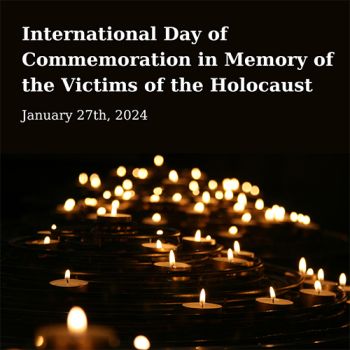The International Day of Commemoration in Memory of the Victims of the Holocaust

By Emily Rafuse
Accessibility and Human Rights Intern, 5th year English Major, Acadia University Student
January 27th is the International Day of Commemoration in Memory of the Victims of the Holocaust, which comes in the wake of rising antisemitism across North America, from celebrities making antisemitic remarks to high-profile politicians dining with Holocaust deniers, it is important to recognize this day and educate ourselves.
The liberation of the Nazi Concentration and Extermination Camp of Auschwitz-Birkenau in 1945 was less than a century ago, today atrocities persist, and antisemitism continues to rise, it is more important than ever to remember why we commemorate this day.
Recognition of the International Day of Commemoration in Memory of the Victims of the Holocaust began in 2005 and takes place annually around January 27th. On this day, we focus on educating ourselves about the Holocaust, what events led up to it, and we renew our promise of “Never Again.” Never again can we afford to turn away from genocide, never again can we afford to be neutral and look on while atrocities are committed. We must do the work to ensure that “never again” does not become “time and time again.”
According to Britannica, antisemitism is,
“Hostility toward or discrimination against Jews as a religious group or race. Although the term anti-Semitism has wide currency, it is regarded by some as a misnomer, implying discrimination against all Semites, including Arabs and other peoples who are not the targets of anti-Semitism as it is usually understood." (Brittanica 2024).
Antisemitism is not always an explicit act; it can be a comment, an act of vandalism such as writing comments on posters, it can be perpetuating myths that you have heard without doing research to ensure you understand the implications of what you are saying.
Take some time today to remember the victims of the Holocaust and educate yourself about the Holocaust, antisemitism, and the genocide convention.
Bystander Intervention to Stop Antisemitic Harassment
Online Training: Registration
Date: February 6, 2024
Time: 12:00 PM - 1:15 PM AST
Hosted by: Right To Be
This 75-minute interactive training will teach you Right To Be’s 5D’s of bystander intervention methodology, created in collaboration with T'ruah: The Rabbinic Call for Human Rights. We’ll start by talking about the forms of antisemitism that the Jewish community faces right now — from microaggressions to violence — using a tool we call the “spectrum of disrespect.” You’ll learn what to look for and the positive impact that bystander intervention has on individuals and communities. We’ll talk through five strategies for intervention: distract, delegate, document, delay, and direct, and how to prioritize your own safety while intervening. We’ll have time at the end for practice, and you’ll leave feeling more confident intervening the next time you see antisemitic harassment online or in person.
Learning Resources
Museums are good places to start educating yourself about the Holocaust, and many have virtual exhibits or digital archives you can examine at any time or place. For instance, the Montreal Holocaust Museum has six virtual exhibits you can look through to educate yourself from home, you can learn more about the Anne Frank House online, the Bergen-Belson Memorial Museum has online collections, as do many more museums around the world, you can find a list here. If you would like to attend a commemoration event, the 2024 Observance of the International Day of Commemoration in memory of the victims of the Holocaust will be livestreamed globally on January 26th at 12PM, on UN Web TV, the United Nations YouTube Channel, and the X broadcast of @UNWebTV.
Online resources:
- Addressing antisemitism through education (UNESCO)
- Combatting Antisemitism with the Arts
- Fondation our ls Mémoire de la Shoah
- UNESCO Facts About the Holocaust
Support
Employees (staff, faculty, admin)
- Employee and Family Assistance Program (EFAP) 1 800 387-4765.
- Human Resources - Mental Health and Ongoing Resources
Students
- Acadia University Counselling Services . Located in the Old SUB. We are here to help. Open Monday-Friday from 8:30am-12pm & 1:30pm-4:30pm. To book an appointment please call 902.585.1246 or email counselling@acadiau.ca.
- Good2Talk Call 1.833.292.3698 for a free, confidential helpline that provides professional counselling and support for university and college students.
Everyone
- For emergency or after hours service on-campus, please call Safety & Security at 902.585.1103
- NS Mental Health Crisis Line
- Dial 1.888.429.8167 for this toll free, 24/7 services delivered by the Mental Health Mobile Crisis Team (MHMCT). This provincial service provides crisis intervention for children, youth, and adults experiencing a mental health crisis or mental distress, or call 911. Or go to your nearest hospital or emergency department.
To share a concern, engage in a discussion of harassment or discrimination that you have witnessed, or been harmed by, or ask questions about Acadia’s Policy Against Harassment and Discrimination please contact the Human Rights and Equity Office at equity@acadiau.ca. We also encourage you to read and review the Policy (PDF).
Submit a Question
Contact
Equity, Diversity & Inclusion Committee
31 University Ave
Wolfville, Nova Scotia, B4P 2R6
edicommittee@acadiau.ca
